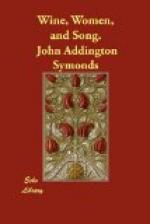See the foe my life invade!
Haste, oh haste, to give me
aid!
Bring me comfort and heart’s
ease,
Strengthen me in this disease!
Father.
Oh, my best-beloved son,
What is this thou wouldst
have done?
Weigh it well in heart and
brain:
Do not leave me here in pain.
Son.
Father, this thy loving care
Makes me weep full sore, I
swear;
For you will be childless
when
I have joined those holy men.
Father.
Therefore make a little stay,
Put it off till the third
day;
It may be your danger is
Not unto the death, I wis.
Son.
Such the anguish that I feel
Through my inmost entrails
steal,
That I bide in doubt lest
death
Ere to-morrow end my breath.
Father.
Those strict rules that monks
observe,
Well I know them! They
must serve
Heaven by fasting every day,
And by keeping watch alway.
Son.
Who for God watch through
the night
Shall receive a crown of light;
Who for heaven’s sake
hungers, he
Shall be fed abundantly.
Father.
Hard and coarse the food they
eat,
Beans and pottage-herbs their
meat;
After such a banquet, think,
Water is their only drink!
Son.
What’s the good of feasts,
or bright
Cups of Bacchus, when, in
spite
Of all comforts, at the last
This poor flesh to worms is
cast?
Father.
Well, then, let thy parent’s
moan
Move thee in thy soul, my
son!
Mourning for thee made a monk,
Dead-alive in darkness sunk.
Son.
They who father, mother love,
And their God neglect, will
prove
That they are in error found
When the judgment trump shall
sound.
Father.
Logic! would thou ne’er
hadst been
Known on earth for mortal
teen!
Many a clerk thou mak’st
to roam
Wretched, exiled from his
home.—
Never more thine eyes, my
son,
Shall behold thy darling one,
Him, that little clerk so
fair,
N., thy friend beyond compare!
Son.
Oh, alas! unhappy me!
What to do I cannot see;
Wandering lost in exile so,
Without guide or light I go!—
Dry your tears, my father
dear,
Haply there is better cheer;
Now my mind on change is set,
I’ll not be a monk,
not yet.
XIX.
The order adopted in this essay brings us now to drinking-songs. Next to spring and love, our students set their affections principally on the tavern and the winebowl. In the poems on the Order we have seen how large a space in their vagrant lives was occupied by the tavern and its jovial company of topers and gamesters. It was there that—




